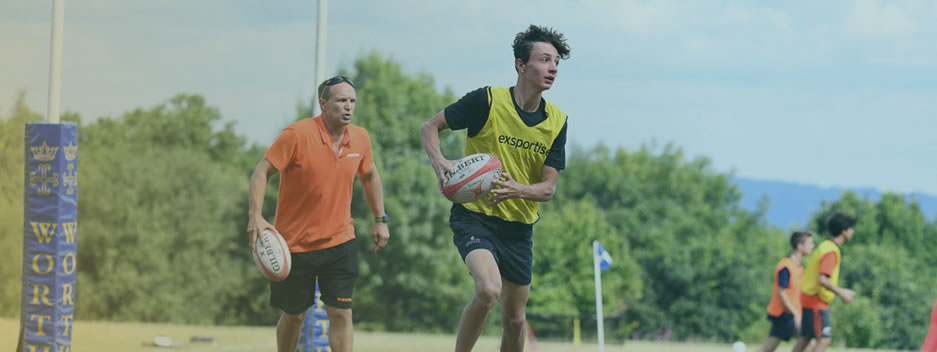Why You Should Train Through the Off-Season
- June 18th, 2019
- Tom Bean

It's easy to see the off-season as a time to relax and enjoy yourself, to put your feet up and not think about your sport for a few months before you get going for pre-season again.
And hey, why not!? You earned it over a long and gruelling season over the months before, right?
Well not exactly...
To a point, the off-season is about taking the time to rest up. But it's also a great time to be re-focussing, prepping and making improvements for the upcoming season.
For both coaches and players, the off-season should been seen as the perfect time to make strides without the pressure and stresses of the full season in an enjoyable and relaxed environment.
Discover why you need to strike the perfect balance in your training this off-season.
Prevents Panic Training
When it comes round to pre-season, you don't want to be well off the pace. The start of pre-season is about getting match-ready, making you sharper and quicker rather than developing your base level fitness - that's a job for the off-season.
Leaving it too late causes stress and panic that can be easily avoided. Maintain your fitness over the off-season so that when you come to pre-season you can really push yourself in the sharpening sessions, rather than burning yourself out by cramming in more sessions that you need to.
For a coach, when players keep fit over the off-season, they have more freedom to start with more advanced sessions rather than starting with basic fitness and skills sessions. Having this head start in pre-season will soon see you reap the rewards going into the main season!
Reduces Risk of Injury
Going from doing nothing in the off-season to hitting the ground hard in pre-season is only going to end one way. To reduce the risk of injury when you come back into pre-season, it's vital you continue some activity over the off-season to maintain and increase your muscular strength.
However, there is a fine balance to be struck with this; over-training can equally cause chronic injuries. It's important to recognise that after a long season, the body needs to rest and recover to prevent overuse injuries.
Therefore, as a coach, it's important that you manage your athletes workloads so that they strike a balance between overtraining and under-training.
Chance to Correct Defects
Over the course of a full-season, bad habits and technical flaws creep into players games and coaches methods. The off-season offers a great opportunity to correct these away from the pressures of matches and competitive sessions.
The lack of pressure helps individuals refocus on the intricacies of their sport, rather than just doing enough to get the results. A coach can rediscover their coaching philosophies and develop a clear idea of how they want to lead their sessions.
For players, defects can be addressed in an environment that isn't dictated by time or other players, giving them the scope to improve their technique in a more controlled environment.
The same can be said for physical training too. Within a busy season, it's tough to really make strides in strengthening potential imbalances or weaknesses for fear of not feeling fresh for games. Without these pressures, the time is there to spend on concerted efforts and proper recovery.
Opportunity to Enjoy New Activities
Maintaining fitness and activity levels doesn't mean carrying on with the same sport, doing the same exercises and sticking to the same routine. Get away from your sport and discover new ways to stay fit and get stronger.
Try a different sport and pick up new skills that you can transfer into your own sport. For example, if you're a hockey player, go and play tennis - seeing and hitting balls on different plain and trajectories could just give you a new angle to look at how you hit the hockey ball when you get back on the pitch.
Plus, your body gets a rest from the regular vigours of your sport-specific movements, strengthening other parts of the body through the different types of movement in other sports.
As a coach, getting away from your sport and experiencing different coaches and coaching other activities will give you a great new perspective on how to overcome new challenges. You will learn different approaches that you could well be able to transfer to your own sport for the upcoming season.
Develop New Ideas Free from Pressure
Continuing a level of training throughout the off-season gives players and coaches the opportunity to try new ideas away from the pressure that comes with having to get it right for matches in the main season.
Not only is it a chance to correct defects, individuals can also learn new skills in a low-pressure environment. This lack of pressure that comes with the nature of the off-season often allows players to rediscover their enjoyment for the sport after a long season.
Recharging motivation levels is vital for coaches and players alike - by teaching and learning more advanced skills and approaching things from different angles can refresh an individual's interest in seeking improvement.
There are many positives to training throughout the off-season so long as you find the balance between resting and overtraining. Individuals need to be recuperating after a long season, but doing enough to learn new skills, correct technical issues and maintain fitness levels.
Trying new sports or activities is a great way to refresh an individual's perspective on their sport and allows them to discover different approaches and learn new skills. The off-season lends itself to refining techniques away from a pressurised environment and if done properly, will see players and coaches going into pre-season full of confidence.
The prep out of season will dictate your start to the new one. Focus on maintaining, strengthening and learning in the off-season to hit the ground running come pre-season.